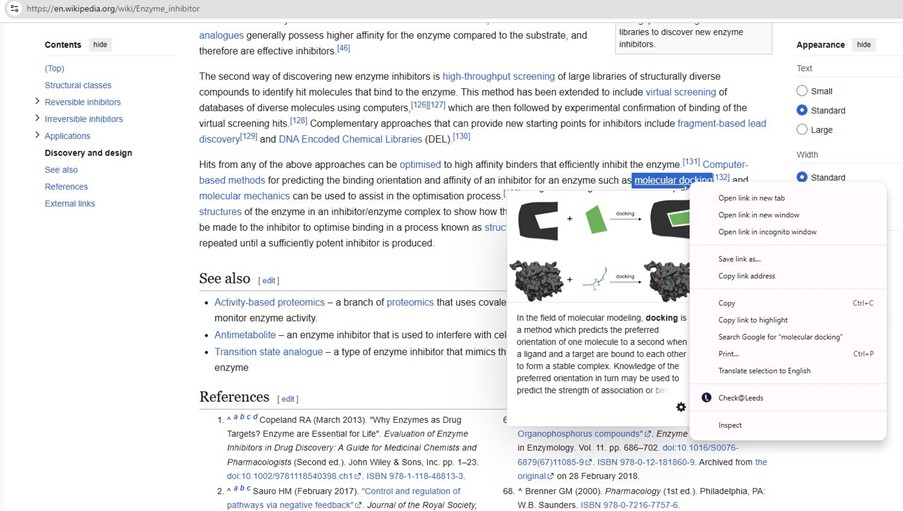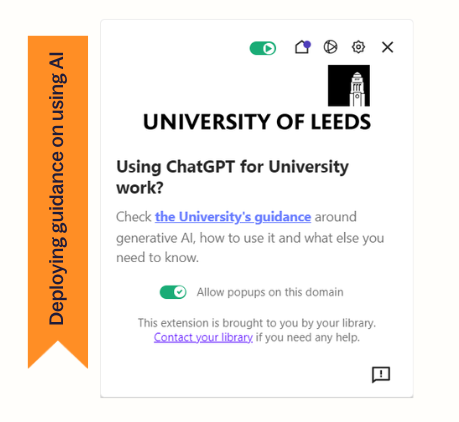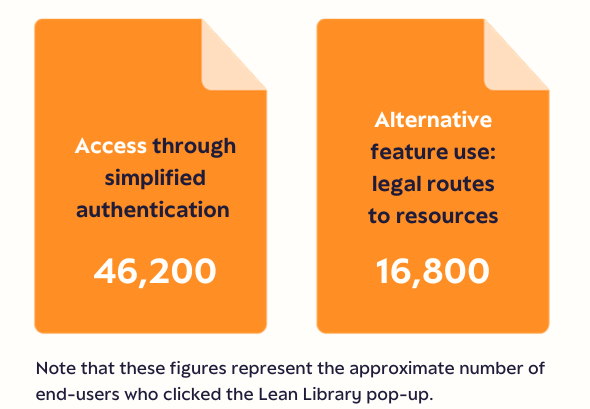Each month we select a Library of the Month to honor libraries who have been using our library technologies in interesting and innovative ways, from creating well-curated reading lists with Talis Aspire to driving usage of library content with Lean Library.
The winning library will be awarded a prize to share amongst their team or a donation to a charity of their choice as a way for us to say thank you.
University of Pikeville (UPIKE) is a private, liberal arts university located in Pikeville, Kentucky, United States. Founded in 1889, around 2,000 students currently attend UPIKE.
We’ve awarded them our Library of the Month Award for September, as they are great advocates of both Lean Library and Lean Library Workspace. Lean Library Workspace is the latest offering from Lean Library which provides libraries and their users with an all-in-one offering that supports the entire research journey, from content discovery and access through to authoring work.

We asked Edna Fugate, CA, Director of Library Services, Allara Library at UPIKE to tell us more about what winning Library of the Month means:
“UPIKE’s Allara Library has a wonderful group of librarians and staff, as well as a supportive and collaborative campus community. Lean Library and Lean Library Workspace offer us the opportunity to share library resources on an even greater scale than before.
We are also able to reach out to other departments and provide opportunities to work together to make sure UPIKE’s students are prepared to have a successful university experience. We are excited to be recognized as Technology from Sage’s Library of the Month!”
Discover our previous winners below:
Could your library be next?
Join us next month to see who’s won.
Lean Library Case Study: University of Leeds September 8, 2025
Established in 1904, University of Leeds is one of the largest universities in the UK. They are part of the Russell Group of research-intensive universities and have more than 37,000 students currently studying at the institution.
The university faced a common challenge which many university libraries experience: how to ensure students are aware of library-subscribed content and collections even when they begin their research outside of the library discovery, for example, on sites such as Google Scholar and ChatGPT.
What challenges was your library facing before using Lean Library?
“While undergraduate students made frequent use of our main discovery service, a significant number of postgraduate researchers accessed content through other routes and were therefore often unaware of the library’s owned and subscribed content.
Lean Library helped us address this issue by integrating with the user’s workflow, quickly revealing and providing access to library-owned and subscribed materials, regardless of where the user began their search.”
– Alison Hazelaar, Access & Acquisitions Manager: Metadata & Discovery at University of Leeds Libraries.
In 2024 University of Leeds implemented Lean Library, a library tool which integrates library collections and services directly into student online workflows via the browser extension, to embed library guidance and library-subscribed content wherever the student is in their research journey. This not only makes it easier for students and researchers to easily access the wealth of resources available to them but promotes the library throughout user workflows.
University of Leeds have maximised Lean Library features including Assist Messages, Advanced Library Search (ALS) and Print Alternatives, to further amplify the library’s value and more deeply communicate messages to students.
Which is your favourite feature you have implemented and why?
“One of our favourite features has been the use of Assist Messages which we have added to several websites to offer guidance to users. One example is the Assist Message pop-up which allows the user a link to check the Universities guidance around Generative AI and how to use it.
Check@Leeds, allowing users to highlight a word or topic on any website and search Leeds holdings from there has also been a big hit!”
– Alison Hazelaar, Access & Acquisitions Manager: Metadata & Discovery at University of Leeds Libraries.

Figure 1: Screenshot of Check@Leeds which allows users to highlight a word or topic on any website and brings them to University of Leeds holdings.
University of Leeds have set up Assist Messages across the AI websites which students visit the most including: Perplexity, Claude, Copilot and ChatGPT. Assist Messages about AI guidance have the highest amount of views (nearly 8,500 views across these messages) amongst students compared to other types of Assist Messages. This shows that library advice on using AI is impactful and needed amongst students at the point-of-need.

Figure 2: University of Leeds Assist Message which advises students on the University’s guidelines around Generative AI when they visit the ChatGPT website.
Find out more about how libraries can deploy AI guidance to students here.
University of Leeds have also utilised Additional Library Search (ALS) to brings the power of their library discovery service to Google – where many students begin their search for research. Students can pull their library’s discovery search results into their Google and Google Scholar search result page via the Lean Library extension to discover more content from their library.
Additionally, University of Leeds have seen great usage of the Access and Library Alternatives features amongst their students. The Access feature simplifies access to eResources the library subscribes to, whilst Library Alternatives connects users to alternative resources in the library’s holdings when they hit paywalled resources online.

Figure 3: University of Leeds Access and Alternatives feature use amongst students using Lean Library in 2025.
The Print Alternatives feature, a new enhancement to Lean Library’s existing Alternatives feature, seamlessly surfaces the library’s print book availability when users search for books online. University of Leeds was the first adopter of the Print Alternatives feature and are excited about what this means for increasing usage of library print collections with the library commenting “It is just getting better”. This enables institutions to maximize the impact of their print collections alongside digital offerings.
Read more about the Print Alternatives feature here.
Implementing Lean Library at University of Leeds has ensured discovery of both library-subscribed content and legal, Open Access papers for students whether they begin researching outside of the library or via the library catalogue.
“We had existing data that showed that we’re slightly unusual in having users who do start with our library search but now we’re better able to meet the needs of those users who were starting their search journeys elsewhere. It’s another string to our discovery bow!”
– Alison Hazelaar, Access & Acquisitions Manager: Metadata & Discovery at University of Leeds Libraries.
Since adopting Lean Library in August 2024, University of Leeds have 600 engaged monthly users using Lean Library.
This has been increasing consistently since February 2025 due to targeted outreach efforts from the library earlier this year:
How did you promote Lean Library at your institution to users?
“We’ve promoted Lean Library through three main channels:
• Intra-Library Outreach where we introduced and demonstrated Lean Library to library colleagues, including a full All staff meeting. We have given tailored presentations to specific teams, addressing their questions and sharing promotional materials.
• Faculty Outreach with sessions held with academic and postgraduate colleagues to discuss LL as an alternative access option.
• Communications Support via The Library Communications team who launched a dedicated webpage in January 2025, followed by a full campaign in February. This campaign used news stories, banners, social media posts, and digital displays.
• The publisher negotiations that were happening from 2024 into 2025 also provided another helpful push as we were able to recommend Lean Library to affected departments to highlight how they could still access a wide range of research articles.”
– Alison Hazelaar, Access & Acquisitions Manager: Metadata & Discovery at University of Leeds Libraries.

Do you have any feedback from students or users at your institution?
“We have mostly been letting the statistics do the talking in this first year of having Lean Library. We have exceeded our projection for sign-ups and we now concentrate on the active user metric to show that it’s still very much being used.
User experience is very important to us and, as we move into year 2 [of using Lean Library], we will be thinking about how we can gather first-hand feedback from users.”
– Alison Hazelaar, Access & Acquisitions Manager: Metadata & Discovery at University of Leeds Libraries.
What are you looking to do next with Lean Library?
“We are looking forward to promoting Lean Library Workspace to help users organise and manage both their reading and research in one single place. We’re also excited to learn more about the one One-Click to PDF widget which provides instant access to PDF versions of articles.”
– Alison Hazelaar, Access & Acquisitions Manager: Metadata & Discovery at University of Leeds Libraries.
Find out more about Lean Library.
If you’d like to hear more or receive a product demo, get in touch.
Increasing Usage of Library Collections: Ghent University Adopts Lean Library September 4, 2025Ghent University is the second largest University in Belgium, with around 50,000 students and 9,000 staff. It is an internationally renowned university, with a reputation for scientific research, and is ranked in the top 100 universities globally. Ghent University have partnered with Technology from Sage to implement Lean Library at their institution. This will streamline access to information resources and enhance library discovery, for example, highlighting their extensive library collections to students.
Lean Library integrates library collections and services directly into students’ online workflows, making it easier for students to access the resources they need without leaving their current tasks. This not only increases the visibility and usage of library resources but also enhances student productivity by saving them time and effort in accessing necessary research materials.
Remarking on the adoption of Lean Library, Ghent University library comment “As a library, we strive to lower the barriers to academic content by connecting students and researchers with collections, wherever they begin their search. So we invest in tools that empower everyone to use our collections effortlessly.”
Ghent University were aware of Lean Library’s capabilities for a few years, and the library’s recent transition to EZProxy and Primo was an ideal opportunity to implement Lean Library to ensure that Ghent University’s researchers can easily access the wealth of resources available to them.
Find out more about Lean Library.
If you’d like to hear more or receive a product demo, get in touch.
Announcing Lean Library’s First Further Education Partner, The College Merthyr Tydfil September 4, 2025The College Merthyr Tydfil (TCMT) is a Further Education (FE) college located in Merthyr Tydfil, Wales, United Kingdom with around 4,000 students and 250 staff members. Merthyr Tydfil are partnering with Technology from Sage to implement Lean Library and Lean Library Workspace (formerly Sciwheel) to further showcase library collections within student and researcher workflows.
Lean Library integrates library collections and services directly into students’ online workflows, making it easier for students to access the resources they need without leaving their current tasks. This not only increases the visibility and usage of library resources but also enhances student productivity by saving them time and effort in accessing necessary research materials.
TCMT will also be introducing Lean Library Workspace, an end-to-end research tool, to its students to support them with reference management, project collaboration and authoring work. These capabilities support TCMT’s values of developing student skills and supporting learners of every ability.
Erika Neck, Learning and Digital Resources Coordinator at The College Merthyr Tydfil comments “Our students love using Lean Library, so easy to bring the library service to their research rather than asking them to come to us. The Workspace is the ideal tool to also help them with their referencing and for them to cite resources quickly and easily. This was easy to setup and implement and is a great tool to find resources that we already subscribe to and that are Open Access.”
As Technology from Sage’s first FE partner for Lean Library, TCMT is poised to provide a more supportive, and stress-free learning environment for its student community.
Find out more about Lean Library and Lean Library Workspace.
If you’d like to hear more or receive a product demo, get in touch.